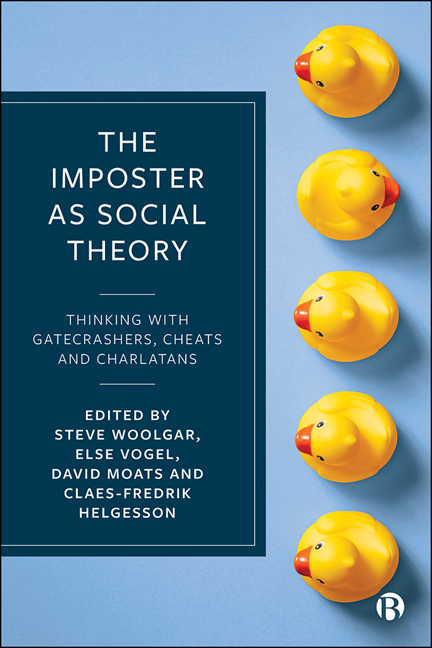Book contents
- Frontmatter
- Contents
- List of Figures and Boxes
- Notes on Contributors
- Preface
- 1 Thinking with Imposters: The Imposter as Analytic
- 2 The Desire to Believe and Belong: Wannabes and Their Audience in a North American Cultural Context
- 3 A Menagerie of Imposters and Truth-Tellers: Diederik Stapel and the Crisis in Psychology
- 4 Learning from Fakes: A Relational Approach
- 5 Imitations of Celebrity
- 6 Natural Imposters? A Cuckoo View of Social Relations
- 7 Conjuring Imposters: The Extraordinary Illusions of Mundanity
- 8 States of Imposture: Scroungerphobia and the Choreography of Suspicion
- 9 The Face of ‘the Other ’: Biometric Facial Recognition, Imposters and the Art of Outplaying Them
- 10 Faking Spirit Possession: Creating ‘Epistemic Murk ’ in Bahian Candomblé
- 11 The Guerrilla’s ID Card: Flatland against Fatland in Colombia
- 12 Good Enough Imposters: The Market for Instagram Followers in Indonesia and Beyond
- 13 Thinking beyond the Imposter: Gatecrashing Un/Welcoming Borders
- 14 Postscript: Thinking with Imposters – What Were They Thinking?
- Index
3 - A Menagerie of Imposters and Truth-Tellers: Diederik Stapel and the Crisis in Psychology
Published online by Cambridge University Press: 22 December 2021
- Frontmatter
- Contents
- List of Figures and Boxes
- Notes on Contributors
- Preface
- 1 Thinking with Imposters: The Imposter as Analytic
- 2 The Desire to Believe and Belong: Wannabes and Their Audience in a North American Cultural Context
- 3 A Menagerie of Imposters and Truth-Tellers: Diederik Stapel and the Crisis in Psychology
- 4 Learning from Fakes: A Relational Approach
- 5 Imitations of Celebrity
- 6 Natural Imposters? A Cuckoo View of Social Relations
- 7 Conjuring Imposters: The Extraordinary Illusions of Mundanity
- 8 States of Imposture: Scroungerphobia and the Choreography of Suspicion
- 9 The Face of ‘the Other ’: Biometric Facial Recognition, Imposters and the Art of Outplaying Them
- 10 Faking Spirit Possession: Creating ‘Epistemic Murk ’ in Bahian Candomblé
- 11 The Guerrilla’s ID Card: Flatland against Fatland in Colombia
- 12 Good Enough Imposters: The Market for Instagram Followers in Indonesia and Beyond
- 13 Thinking beyond the Imposter: Gatecrashing Un/Welcoming Borders
- 14 Postscript: Thinking with Imposters – What Were They Thinking?
- Index
Summary
Introduction
On 7 September 2011 the career of Diederik Stapel, social psychologist at Tilburg University in the Netherlands came to a sudden end. Twelve days earlier his colleague and friend Marcel Zeelenberg had confronted him with detailed evidence that he had fabricated results, evidence which had been meticulously collected by three young researchers of Stapel's own research group. Stapel thought he had managed to talk his way out of it, but Zeelenberg informed the vice-chancellor. After failing to convince the vice-chancellor in their first conversation Stapel, with mounting panic, travelled half the country to visit the places where he had supposedly collected his data, in order to construct a plausible story and make sure he got the details right. It was to no avail, and finally, accompanied by a lawyer, Stapel confessed: he had made up data, and had been doing so for many years. His house of cards, as he would later call it, had come tumbling down. In retrospect, Stapel's confession to the vice-chancellor was a rare moment of order and consensus in a saga that is otherwise characterized by differences of opinion, conflicting stories and a lack of confidence in the discipline of psychology as a whole. While they sat at a table in the vice-chancellor's home, for a brief instant, there was clarity: Stapel confirmed that the accusations were correct, he had fabricated data, he was a fraud. But as the story hit the press and became national news, questions started to be asked again. A few people rather hopefully speculated that it might be a hoax, perhaps perpetrated by Stapel himself. These fanciful speculations were quickly squashed, but many questions remained. How long had it been going on? How many of his papers were fraudulent? A commission had been created to investigate the matter, but it wasn't just Stapel who was under scrutiny. The Stapel affair hit psychology at a time when its research practices were already increasingly being examined. A reform movement was emerging that used Facebook and Twitter as its media to discuss the ways that psychologists produce publishable results. Inevitably the question arose to what extent Stapel's fraud was emblematic of what was starting to be called the ‘crisis of confidence’ in psychology.
- Type
- Chapter
- Information
- The Imposter as Social TheoryThinking with Gatecrashers, Cheats and Charlatans, pp. 53 - 76Publisher: Bristol University PressPrint publication year: 2021



